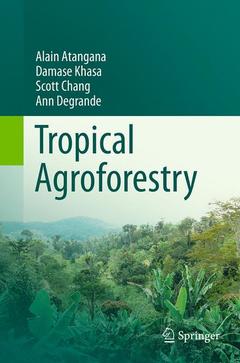Tropical Agroforestry, Softcover reprint of the original 1st ed. 2014
Auteurs : Atangana Alain, Khasa Damase, Chang Scott, Degrande Ann

Preface.- Acknowledgements.- Table of Contents.- List of Figures.- List of Tables.- Part I: Tropical Biomes, Land Use Issues and Introduction to Agroforestry Systems.- 1. Tropical biomes: classification and description.- 2. Major Land Use Issues in the Tropics, and the History of Agroforestry.- 3. Definitions and Classification of Agroforestry Systems.- 4. Major Agroforestry Systems of the Humid Tropics.- 5. Major Agroforestry Systems of the Semiarid Tropics.- 6. Participatory Domestication of New Crops using Agroforestry Techniques.- Part II: The Benefits and Services of Agroforestry Systems.- 7. Ecological Interaction and Productivity in Agroforestry Systems.- 8. Biological Nitrogen Fixation and Mycorrhizal Associations in Agroforestry.- 9. Agroforestry for Soil Conservation.- 10. Carbon Sequestration in Agroforestry Systems.- 11. Agroforestry and Biodiversity Conservation in Tropical Landscapes.- 12. Integrated Pest Management in Tropical Agroforestry.- 13. Diagnosis and Design (D & D) Approach and Participatory Rural Appraisal (PRA).- 14. Experimental Design in Agroforestry.- 15. On-Farm Agroforestry Research.- 16. Economics in Agroforestry.- 17. Socio-Cultural Aspects of Agroforestry and Adoption.- 18. Tropical Agroforestry for Biofuels Production.- 19. Phytoremediation in Tropical Agroforestry.- 20. Agroforestry and the Carbon Market in the Tropics.- 21. Agroforestry Modeling.
Alain R. Atangana received a Ph. D. degree in forest genetics from Université Laval, Canada. He researched participatory domestication of high-value multipurpose trees of the humid tropics of Africa using agroforestry techniques for more than ten years. He also investigated rooting ability in priority tree species for domestication using leafy stem cuttings. Alain has published in eleven peer-reviewed journals, including Food Chemistry, Tree Genetics and Genomes, Molecular Ecology Resources, Forest Ecology and Management, Canadian Journal of Forest Research, Forest Science and Agroforestry Systems.
Dr. Damase Khasa is a Professor and Program director of agroforestry and international forestry at the Faculté de foresterie, de géographie et de géomatique of Université Laval, and Adjunct Professor at the University of Alberta. He is a regular member of the Centre for Forest Research, the Canada Chair in forest and environmental genomics and the Institute of Integrative and Systems Biology. His research interests include: agroforestry; population and quantitative genetics; development of molecular markers for plant breeding and molecular ecology applications; plant symbioses and biotechnology; reclamation and intensive silviculture in the context of REDD+. Damase has published more than 90 papers in 54 peer-reviewed journals, including Molecular Ecology, Forest Ecology and Management, Forest Science, Tree Genetics and Genomes, Genome, Journal of Molecular Evolution, Molecular Phylogenetics and Evolution, Restoration Ecology, American Journal of Botany, World Journal of Microbiology & Biotechnology, Mycorrhiza, Microbial Ecology, Tree Physiology, Phytochemistry and Agroforestry Systems.
Dr. Scott Chang is a Professor in Forest Soils and Nutrient Dynamics in the Department of Renewable Resources, University of Alberta, Canada. Dr. Chang’s research interests are in forest soil processes (N and P cycling inparticular), soil m
Date de parution : 10-2016
Ouvrage de 380 p.
15.5x23.5 cm
Date de parution : 11-2013
Ouvrage de 380 p.
15.5x23.5 cm



